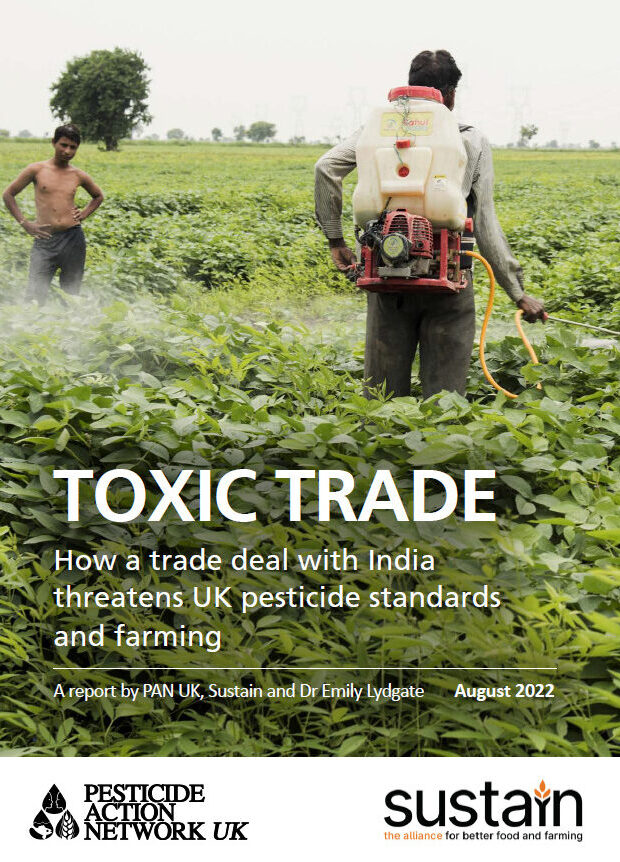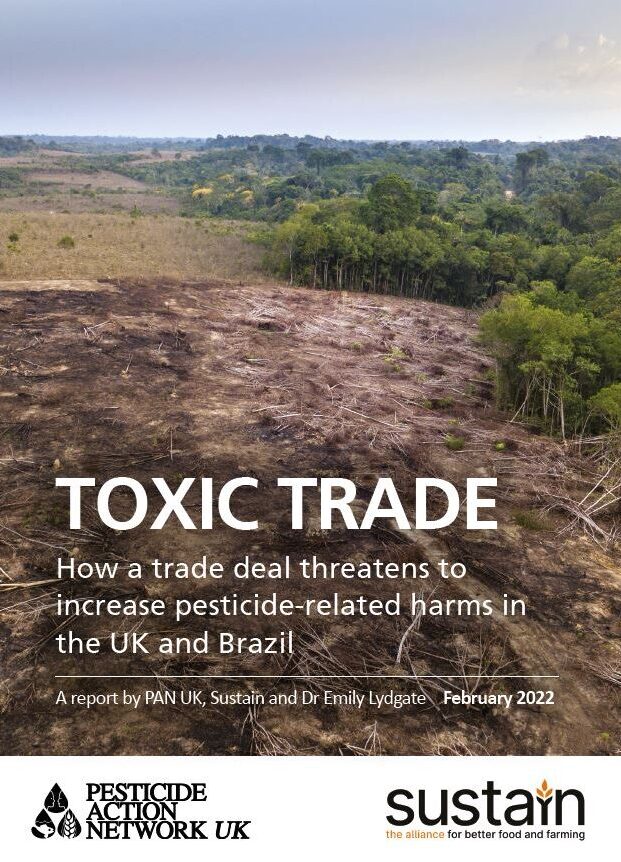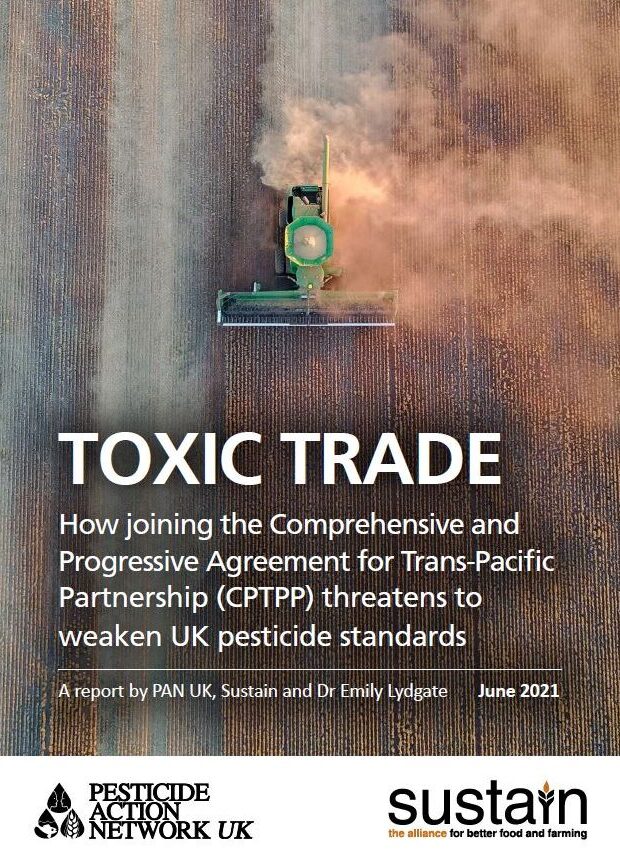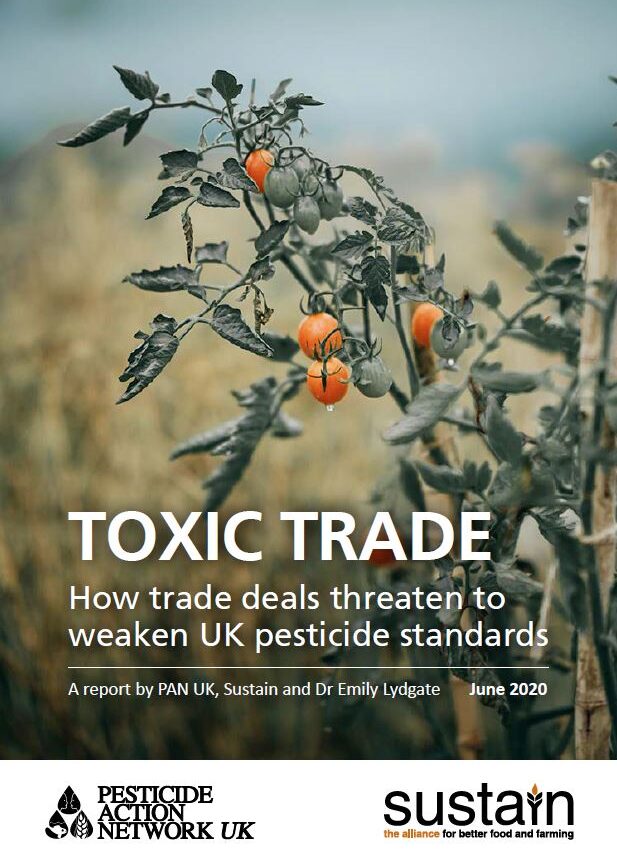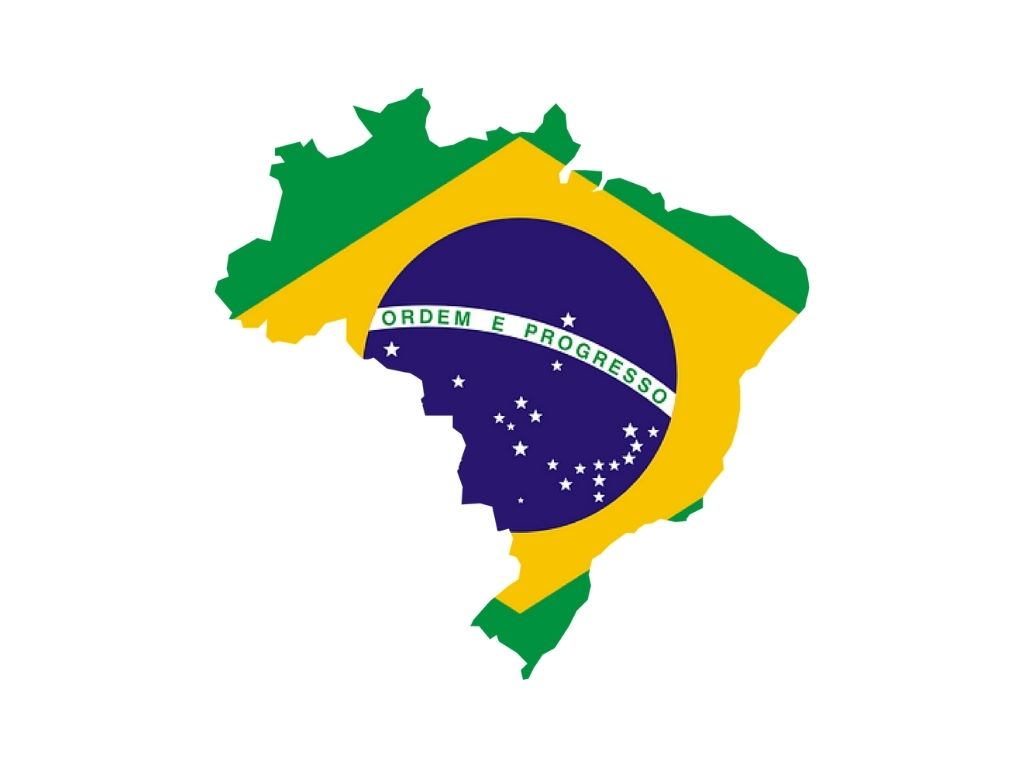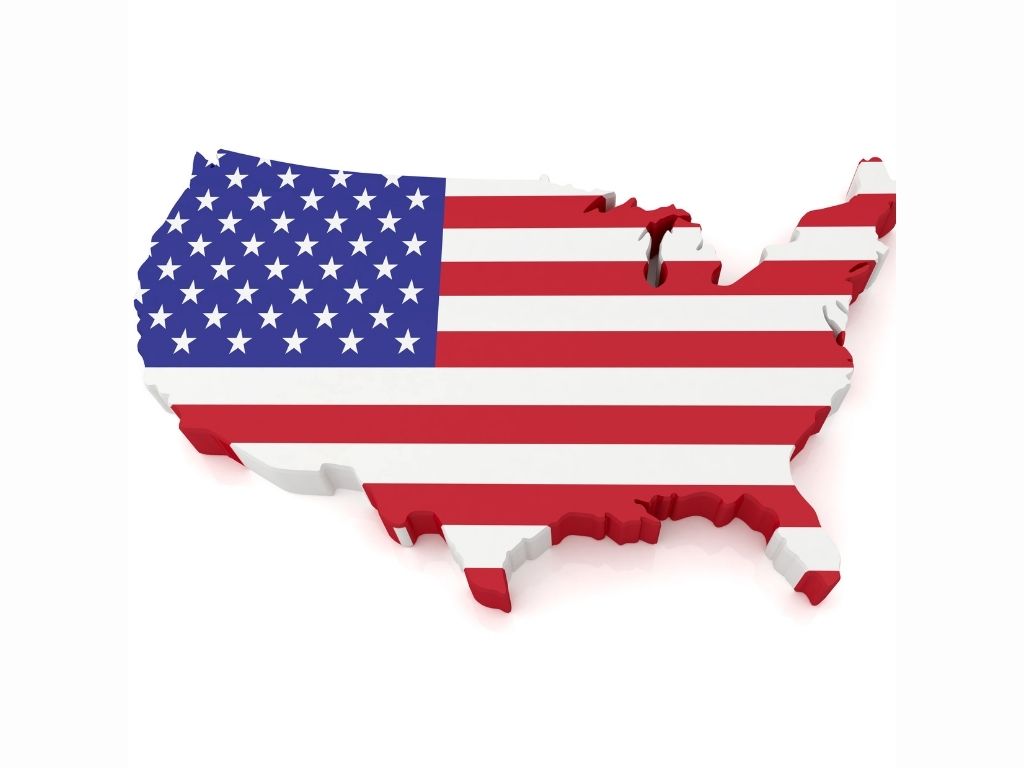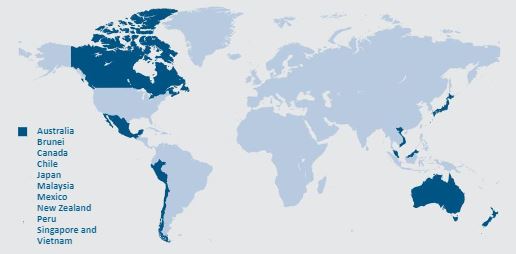Toxic Trade
The UK is in the process of negotiating trade deals in the wake of its exit from the EU. While far from perfect, UK pesticide standards are some of the strongest in the world in terms of protecting human health and the environment. UK safety limits for the levels of pesticides allowed to appear in food tend to be more stringent than in the majority of other countries outside the EU. A pesticide is also more likely to be banned in the UK due to concerns over the harms it causes than in many of the non-EU countries slated for post-Brexit trade deals.
As a result of these relatively high standards, future trade deals with non-EU countries with weaker pesticide protections present a considerable risk to the health of UK citizens and the environment. Trade partners attempting to secure access to the UK market for their food exports have much to gain and so the UK Government is likely to come under pressure to weaken our domestic pesticide standards when negotiating bilateral trade agreements with countries such as the US and Australia, or joining multilateral trade deals like the Comprehensive and Progressive Agreement for Trans-Pacific Partnership (CPTPP).
Trade poses a threat to current UK pesticide standards in three key areas:
Risk 1: Amount of pesticides in food imported into UK could increase
Governments set Maximum Residue Levels (MRLs) which place limits on how much of a specific pesticide is allowed to appear in a particular food item. The UK’s current approach is more precautionary and so its MRLs tend to be lower (e.g. more stringent) than other non-EU countries.
Risk 2: Type of pesticides in food imported into UK could become more toxic
Under the current UK system, imported produce should not contain detectable residues of any pesticide that is not approved for use in the UK. If the UK agrees to weaken its pesticide standards, then UK consumers could soon find currently prohibited pesticides in their food.
Risk 3: More toxic pesticides could be approved for use in UK
The UK’s relatively precautionary approach to which pesticides it approves for use can come under attack from trade partners seeking to export food currently excluded from the UK market. This could lead to the reversal of existing UK bans on pesticides known to harm human health (such as paraquat) or the environment (like neonicotinoids).
Trade deals also pose an economic threat to the future of UK agriculture. If UK food starts to contain higher levels of more toxic pesticides then British farmers will struggle to meet EU standards, thereby losing their primary export destination which currently accounts for 60% of UK agricultural exports. Equally concerning, British farmers could be undercut by a flood of imported crops grown more cheaply on a larger scale and to lower standards. It’s crucial that the UK Government protects British farming by defending pesticide standards, particularly in trade negotiations with agricultural powerhouses such as Australia and Canada.
PAN is working jointly with Sustain and trade expert Dr Emily Lydgate to explore the implications of post-Brexit trade deals for UK pesticide standards.
Here are the reports in our Toxic Trade series so far:
Frequently Asked Questions
A trade deal is an agreement between countries designed to remove restrictions on goods and services traded between them.
The key area where trade and pesticides intersect is around the global trade in food which totals roughly $2 trillion per year. Countries set different safety limits for how much of a particular pesticide is allowed to appear in an item of food (this safety limit is known as a Maximum Residue Level).
Along with EU countries, the UK has tended to take a relatively precautionary approach to protecting human health from pesticides and so has set more stringent safety limits than other countries such as the US and Australia. As a result, much of the food produced in these countries contains pesticide residues which are too high to meet UK standards. This prevents companies from these countries exporting their produce to the UK. Trade partners therefore have much to gain by pressuring the UK to allow food imports containing higher levels of more toxic pesticides.
In recent years, trade deals have increasingly been used to push for ‘regulatory cooperation’, whereby joint standards are agreed between trading partners. Under this guise, the agrochemical industry and countries such as the US have made concerted attacks on the European approach to regulating pesticides and lobbied strongly for it to be weakened. The UK is already under considerable pressure to take a laxer approach to which pesticides it authorises for use. If the UK Government bows to these demands, then pesticides banned in the UK due to evidence that they impact negatively on human health or the environment could soon be used again in our farms and gardens.
While far from perfect, UK pesticide standards are some of the strongest in the world in terms of protecting human health. However, these relatively high standards prevent other countries from exporting food to the UK and governments therefore push to weaken UK protections.
If UK trade negotiators give way to their demands then the increased risk to human health could be significant. American grapes, for example, are allowed to contain 1,000 times the amount of the insecticide propargite than their UK equivalents. Propargite has been linked to cancer and classified as a ‘developmental or reproductive toxin’, meaning that it can negatively affect sexual function and fertility and can cause miscarriages. An Australian apple can contain 100 times the amount of fenitrothion – an insecticide classified as a suspected endocrine disrupter and cholinesterase inhibitor – than a UK apple.
As well as finding themselves exposed to higher levels of pesticides in their diets, UK citizens could soon have no choice but to consume food containing pesticides that are currently banned from appearing in UK food. The US allows the use of almost 1.5 times the number of highly hazardous pesticides as the UK, while Australia permits almost double. As just one of many examples, unlike the UK, the US and India continue to allow food to contain residues of the insecticide chlorpyrifos which has been shown to negatively affect the cognitive development of foetuses and young children.
There are significant questions about the UK border testing regime for pesticides and whether it is extensive enough to detect shipments of food containing pesticide residues above the UK’s legal limits. Specifically:
- The UK tests a small fraction of produce that is imported or on sale to the public, only around three thousand 1kg samples of food per year. While this testing is useful to an extent, it only provides a snapshot in time because it is inconsistent and piecemeal. For example, mangoes might be tested one year and not the next and only a tiny proportion of mangoes consumed in the UK are tested. Similarly, the limited amount of samples tested does not reflect the huge range of produce available to the UK public.
- The Government argues that it’s unnecessary to test more than 3,000 samples of food per year because the UK runs a risk-based system which focusses on the food most likely to pose a threat to consumer health. However, in 2021, the Government failed to test three-quarters of the previous year’s produce of concern.
- There currently appears to be almost no scrutiny of the UK’s pesticide residue testing regime or its results. For example, PAN UK found some major errors in the 2021 published data which were not picked up by the Government nor any other public body.
- Despite the significant border control challenges posed by EU exit, the UK pesticide residue testing regime does not appear to have experienced a significant rise in investment or staff capacity. As a result, outside of the EU, it is highly likely that the UK lacks the infrastructure and resources required to adequately test imported produce for pesticide residues.
It is therefore fairly likely that food containing illegal levels of pesticides will be able to slip through the net and make it on to UK shelves.
Any weakening of UK pesticide standards via trade deals poses risks not just to human health but also to the environment. Trade partners such as the US and India have a history of challenging the EU’s relatively precautionary approach to which pesticides are allowed for use, and the UK is already coming under similar pressure. Almost all non-EU countries (including Australia, the US and India) allow the use of pesticides which the UK prohibits because they are highly toxic to bees and pollinators, including neonicotinoids which are notorious for driving massive declines in bee populations. Most countries also authorise pesticides known to contaminate groundwater and harm aquatic ecosystems, such as the herbicides atrazine and diuron which are banned for use in the UK.
If the UK Government is to achieve its ambition to “leave the natural environment in a better state than we found it” then it must resist efforts by trade partners to push the UK to authorise, or reverse bans on, pesticides which harm wildlife and contaminate water and soil. It must also avoid exporting its environmental footprint by accepting imports of food or animal feed grown elsewhere using environmentally-damaging pesticides, as well as products that have driven other serious environmental problems such as deforestation.
A drop in UK pesticide standards as a result of a trade deal would also pose a significant economic threat to the future of UK agriculture. If UK food starts to contain higher levels of more toxic pesticides then British farmers will struggle to meet EU standards, thereby losing their primary export destination which currently accounts for 60% of UK agricultural exports. Equally concerning, British farmers could be undercut by a flood of imported crops grown more cheaply using pesticides that are banned for use in the UK due to the harms they cause.
In some cases, the UK allows residues of banned pesticides to appear in food imports. For example, a UK apple producer is not allowed to use the fungicide carbendazim which has been banned for domestic use since 2017. However, imported apples are allowed to contain residues of carbendazim. The UK Government’s own Trade and Agriculture Commission has highlighted this double standard as one of the key issues with both the Australia and New Zealand deals. It’s crucial that the Government protects British farming by defending pesticide standards, particularly in trade negotiations with agricultural powerhouses such as the US and India.
No! Refusing to buy food from a particular country will not stop a trade deal from being signed. Boycotts can also risk having unintended, negative knock-on effects on farmers, especially in poorer countries. It is also often impossible to discern where food has come from, especially if it is contained within a mixed product such as a ready-meal or salad, or if it is served in places such as restaurants and canteens where the origin country is usually not given.
Instead of boycotting particular imports, we need to pressure governments to sign trade deals that support healthy and sustainable forms of agriculture and don’t drive an increase in pesticide use or harms. Locking in high pesticide standards can drive positive changes in importing countries by protecting consumer health. In exporting countries, strong pesticide standards prevent farmers and the natural environment from being exposed to the most hazardous chemicals.
No, in fact it’s the opposite! Adopting strong Maximum Residue Limits (MRLs) and restricting the import of produce that contains residues of banned pesticides is not only good for UK consumers who benefit from having less pesticides in their food but also has the potential to drive positive action in the exporting country. For example, by adopting stringent MRLs, the EU market has driven the Vietnamese Government to support farmers to reduce their pesticide use in order to meet EU standards. While this support is aimed at facilitating trade, it is likely to have the knock-on effect of benefitting the health of both people and the environment within Vietnam itself. This sits in stark contrast to claims made by the UK Government that high UK food standards negatively impact developing countries.
When you consider that roughly 44% of the global population working on farms — 860 million farmers and agricultural workers – are poisoned by pesticides every year it is crucial that the UK uses trade agreements to drive up global pesticide standards rather than create a race to the bottom. For the benefit of farmers and wildlife in poorer countries, as well its own domestic consumers, the UK must maintain (or even strengthen) its MRL requirements and resist all pressure to weaken pesticide standards through trade agreements.
In theory, yes. The UK’s current pesticide standards offer better protection for human health and the environment than those of any non-EU country. Trade negotiations with all non-EU countries therefore pose a threat to UK pesticide standards as countries push to gain access to the UK market for their agricultural exports. The more agricultural produce a country exports the more it has to gain by driving down UK pesticide standards. It’s therefore vital that UK negotiators are most vigilant in defending our pesticide standards in trade negotiations with agricultural powerhouses such as Canada and Australia. If a country does not export much food (such as Japan for example) then it is unlikely to push for UK pesticide standards to be weakened.
In addition to allowing larger amounts of more toxic chemicals to appear in UK food, there are also a range of important differences between the way the UK has chosen to govern pesticides and that of future trade partners. Arguably the most fundamental is that the UK currently takes an approach based on the view that some pesticides are intrinsically hazardous and therefore simply too dangerous to be in use. In contrast, non-EU countries follow an approach based on the belief that almost every risk can be mitigated.
The divergence in the approaches of different trade partners also relate to numerous procedural aspects of the pesticide regime. For example, Australia and India have no set time period for reviewing pesticide approvals, meaning that harmful pesticides can remain in use indefinitely once authorised. In contrast, under the current UK system, pesticides are granted a maximum license of 15 years before having to go through a risk assessment process to be reapproved.
It is crucial that UK trade negotiators understand these differences so they are able to defend aspects of the UK pesticide regime designed to protect human health and environment.
The Precautionary Principle, which emerged in the 1970s, theoretically underpins all current UK decision-making on pesticides. It allows regulators to adopt precautionary measures when scientific evidence about an environmental or human health hazard is uncertain and the stakes are high. For example, when evidence began to emerge that neonicotinoids were driving alarming declines in bee populations the UK Government was able to support a ban on their use on the basis that here was sufficient cause for concern. They did not have to wait for the evidence to be definitive, an often unattainable goal.
In contrast, many of the UK’s potential trade partners follow what is misleadingly termed ‘the science-based approach’. Under this approach, instead of a pesticide manufacturer having to demonstrate that their product is safe, regulators must offer a very high level of scientific proof that a product is dangerous. However, evidence of harms may not emerge for many years and, in the meantime, some of the negative impacts caused – such as the development of malignant tumours or the extinction of particular species – may be irreversible.
Potential trade partners and the agrochemical industry use the term ‘science-based’ as a veiled and publicly palatable way through which to attack the Precautionary Principle. It’s vital that UK negotiators understand the true meaning of ‘science-based ‘and are prepared to defend the vital role that the Precautionary Principle plays in protecting human health and environment from pesticides.
Bilateral trade deals are negotiated between two countries. Both sides set out what they hope to achieve through the deal and negotiate with each other accordingly until an agreement is reached. In contrast, multilateral trade deals have three or more member countries and the core agreement is negotiated between the original signatories. Countries which join multilateral trade deals later, once the deal is already in existence, are expected to comply with the core agreement.
While the UK can therefore make demands to protect domestic pesticide standards in bilateral trade negotiations with individual countries, it is unlikely to be able to do so when joining a multilateral deal like the Comprehensive and Progressive Agreement for Trans-Pacific Partnership (CPTPP). In this case (and when joining other multilateral deals) the UK would be acceding to the deal, not negotiating.
Some multilateral deals do have ways for countries to opt out of specific rules included in their core agreement. However, exemptions usually have to be negotiated with all other members and it would be unlikely for the UK to secure unanimous agreement for a broad exemption from all requirements related to pesticides, particularly if a trade deal’s member countries include large agricultural producers.
The UK Government exited the EU arguing that it no longer wanted to be a ‘rule-taker’, and continues to present trade sovereignty as one of the key benefits of Brexit. However, joining multilateral deals like CPTPP with almost no opportunity to change the text of the core agreement would undeniably reduce the level of control that the UK has over its trade policy.
No! Trade deals are designed to remove restrictions on the trade in goods and therefore aren’t the place to secure better standards.
A closer look at the EU’s existing trade deals reveals the limited prospects for the UK to ‘export’ a more stringent approach to pesticide regulation. These deals don’t actively promote the EU’s precautionary approach to pesticides, in fact it largely goes unmentioned. Through its trade deals the EU has actually subjected itself to some new pressures to deregulate pesticides by creating structures which allow other countries to push for weaker pesticide protections. This is something that UK negotiators should avoid.
The UK is particularly vulnerable to weakening its pesticide regulation through trade deals. This is due to a combination of political pressure to conclude trade deals in order to recoup lost EU market access and ‘make a success’ of Brexit, pressure from some UK lobby groups, and the fact that EU exit has led to a ‘governance gap’ in terms of UK institutions, systems and staff.
In addition, the UK regulatory system is already in flux and subject to fewer checks and balances than the EU provided. So, rather than having a settled domestic regulatory framework as its starting point, the UK Government has rushed to bring EU rules into the UK lawbooks. In doing so, it has replaced a system of EU checks and balances with discretionary powers for UK Ministers to amend, revoke and make regulations. This makes it much easier for the UK to change its pesticide regulations to accommodate trade partners.
This is particularly concerning as the UK Parliament already has a weak influence on UK trade negotiations as compared to, for example, the EU or US. The rules governing trade in the UK offer an extremely limited role for parliamentarians and almost no opportunities for public scrutiny. Currently, no one outside the UK Government can even access the text of a trade deal until it is being ratified, let alone amend it.
The current lack of transparency makes it much more likely that countries with lower pesticide standards will be able to force down UK pesticide protections. In addition, there is a question around whether the UK Government, which relied on the European Commission to negotiate its trade deal for 50 years starting in the 1970s, has the capacity or expertise to withstand attempts to lower pesticide standards, especially given the political pressure to conclude agreements quickly.
With the perfect storm of inexperienced UK trade negotiators, staff shortages, more powerful and well-resourced negotiating partners and a shroud of secrecy enclosing the entire process, trade deals are arguably the most likely route through which the UK’s pesticide standards will be undermined.
Each of our Toxic Trade reports and briefings contains a full list of recommendations, many of which are specific to the Free Trade Agreement in question. The following recommendations for the UK Government apply to all trade agreements across the board:
- Do not allow any weakening of UK pesticide standards via post-Brexit trade agreements. This must include:
- Ensuring that no currently banned pesticides are allowed for use in the UK
- Ensure that food containing detectable residues of currently banned substances cannot be imported into the UK
- Ensure that Maximum Residue Levels are maintained or strengthened.
- Ensure a level-playing field for UK farmers by maintaining existing UK pesticide standards, thereby enabling them to continue exporting to the EU.
- Prevent UK farmers from being disadvantaged by cheap food imports produced to weaker pesticide standards in non-EU countries.
- Maintain the Precautionary Principle as the basis upon which all pesticide-related decisions are made and strengthen its implementation. This includes maintaining the so called ‘hazard-based’ approach to pesticide authorisations.
- Preserve the power for the UK to exercise its right to go above and beyond the status quo and applicable international standards to continually strive for higher levels of consumer and environmental protection.
- Introduce additional legislative protections to ensure that any change to food safety standards or environmental protections subsumed in trade agreements can only be introduced via primary legislation.
- Ensure that trade agreements are developed in the open with the opportunity for full democratic scrutiny.
There has been much public uproar about the UK lowering its food standards via a trade deal to accept ‘chlorinated-chicken’. However, the risks related to pesticides are equally significant but the issue isn’t getting enough public attention so the Government doesn’t feel under as much pressure to protect standards.
Trade talks are ongoing so it’s crucial that we start making noise about this issue now.
Take 1 minute to email your MP to ask them to make sure the UK Government defends your health and environment against Toxic Trade.
Please forward the action on to friends and family and consider sharing it on social media using the hashtag #ToxicTrade
“In an already uncertain economic climate, the lowering of pesticide standards could be catastrophic for UK farming as well as the environment. If UK farmers are forced into using pesticides in order to compete with a flood of cheap food imports then their exports will no longer meet EU standards and they’ll lose one of their key markets. 60% of UK agricultural exports currently go to the EU so this could finish off many farming businesses.”
Vicki Hird, Head of Sustainable Farming at Sustain

Dr Emily Lydgate, University of Sussex

